Annotated Bibliography: Theories for Nurse Practitioners
VerifiedAdded on 2022/08/29
|6
|1237
|24
Annotated Bibliography
AI Summary
This annotated bibliography examines five scholarly articles, each exploring a different theory relevant to nursing practice. The first article analyzes the adaptation of Bowen Family Systems Theory to enhance cultural inclusivity in family therapy. The second article investigates the influence of health beliefs on patient rehabilitation after cardiac events, utilizing the Health Beliefs Model. The third paper focuses on the application of Social Cognitive Theory to foster nurses' cultural competence. The fourth article explores how Family Systems Theory can be used to understand appetite self-regulation in children. The final article describes the use of the Health Beliefs Model to improve nurses' knowledge and behavior regarding needle stick injuries. Each annotation includes a description of the theory/model and a reflection on its relevance to future nursing practice, providing a valuable resource for nurse practitioners.
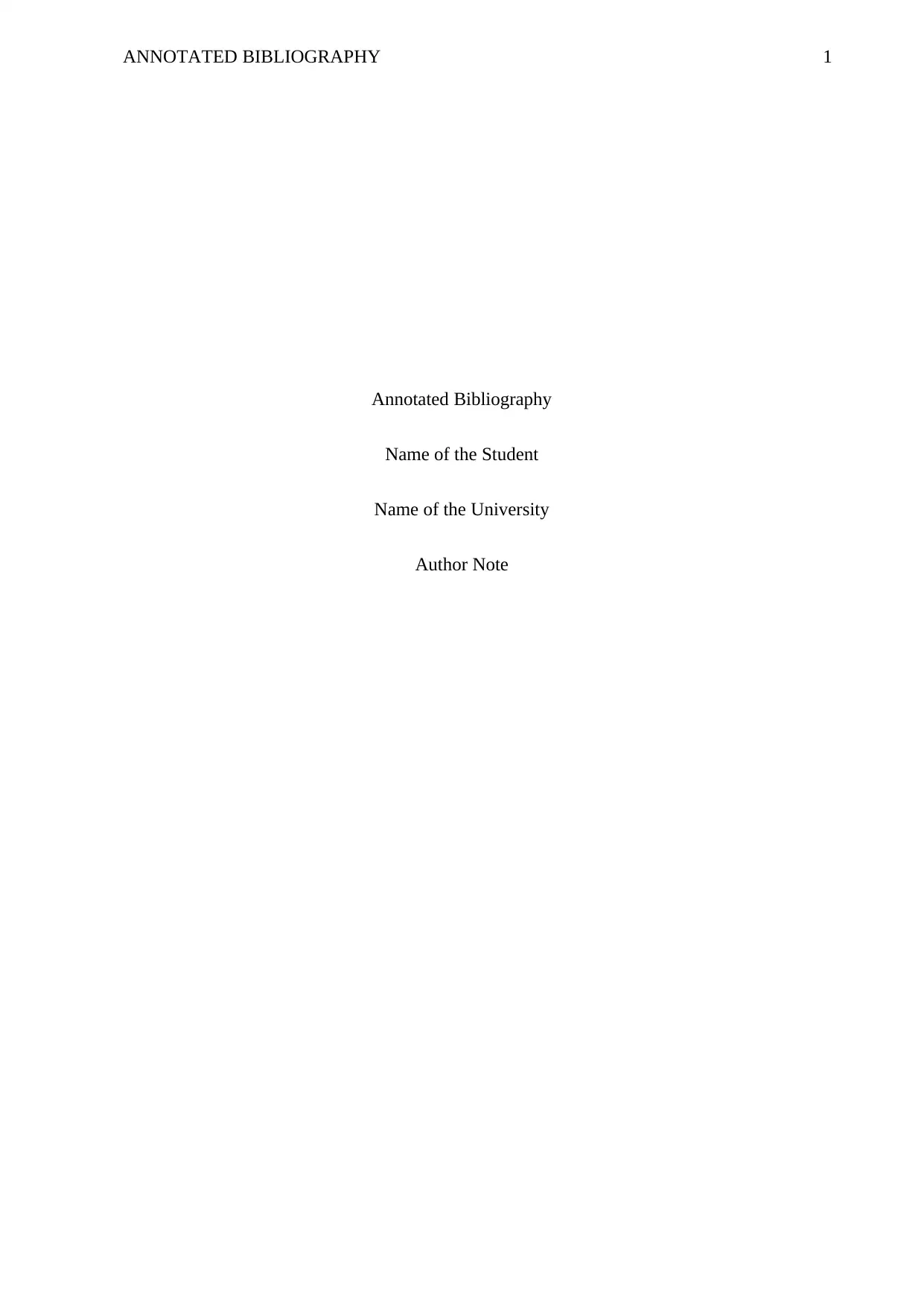
1ANNOTATED BIBLIOGRAPHY
Annotated Bibliography
Name of the Student
Name of the University
Author Note
Annotated Bibliography
Name of the Student
Name of the University
Author Note
Paraphrase This Document
Need a fresh take? Get an instant paraphrase of this document with our AI Paraphraser
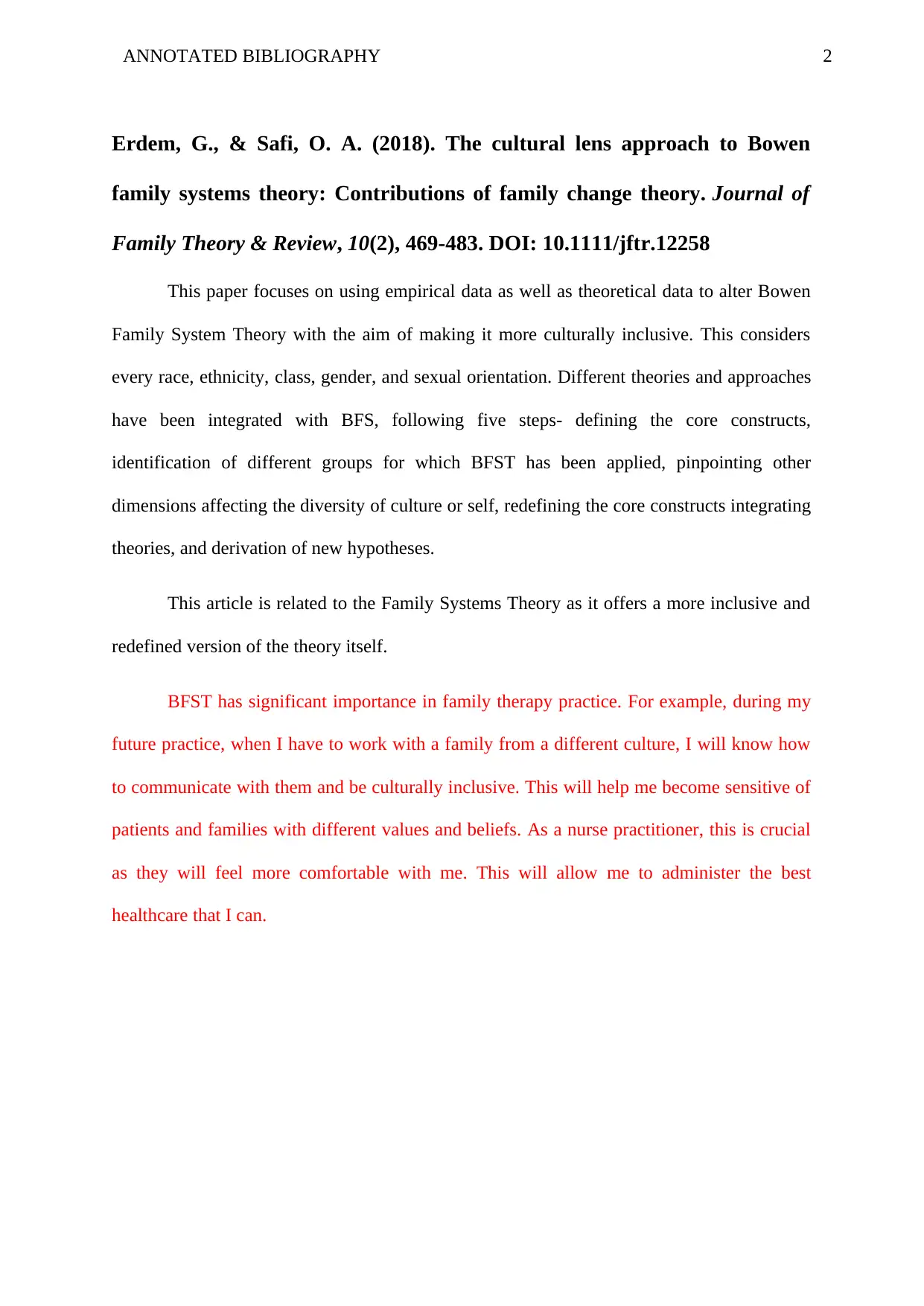
2ANNOTATED BIBLIOGRAPHY
Erdem, G., & Safi, O. A. (2018). The cultural lens approach to Bowen
family systems theory: Contributions of family change theory. Journal of
Family Theory & Review, 10(2), 469-483. DOI: 10.1111/jftr.12258
This paper focuses on using empirical data as well as theoretical data to alter Bowen
Family System Theory with the aim of making it more culturally inclusive. This considers
every race, ethnicity, class, gender, and sexual orientation. Different theories and approaches
have been integrated with BFS, following five steps- defining the core constructs,
identification of different groups for which BFST has been applied, pinpointing other
dimensions affecting the diversity of culture or self, redefining the core constructs integrating
theories, and derivation of new hypotheses.
This article is related to the Family Systems Theory as it offers a more inclusive and
redefined version of the theory itself.
BFST has significant importance in family therapy practice. For example, during my
future practice, when I have to work with a family from a different culture, I will know how
to communicate with them and be culturally inclusive. This will help me become sensitive of
patients and families with different values and beliefs. As a nurse practitioner, this is crucial
as they will feel more comfortable with me. This will allow me to administer the best
healthcare that I can.
Erdem, G., & Safi, O. A. (2018). The cultural lens approach to Bowen
family systems theory: Contributions of family change theory. Journal of
Family Theory & Review, 10(2), 469-483. DOI: 10.1111/jftr.12258
This paper focuses on using empirical data as well as theoretical data to alter Bowen
Family System Theory with the aim of making it more culturally inclusive. This considers
every race, ethnicity, class, gender, and sexual orientation. Different theories and approaches
have been integrated with BFS, following five steps- defining the core constructs,
identification of different groups for which BFST has been applied, pinpointing other
dimensions affecting the diversity of culture or self, redefining the core constructs integrating
theories, and derivation of new hypotheses.
This article is related to the Family Systems Theory as it offers a more inclusive and
redefined version of the theory itself.
BFST has significant importance in family therapy practice. For example, during my
future practice, when I have to work with a family from a different culture, I will know how
to communicate with them and be culturally inclusive. This will help me become sensitive of
patients and families with different values and beliefs. As a nurse practitioner, this is crucial
as they will feel more comfortable with me. This will allow me to administer the best
healthcare that I can.
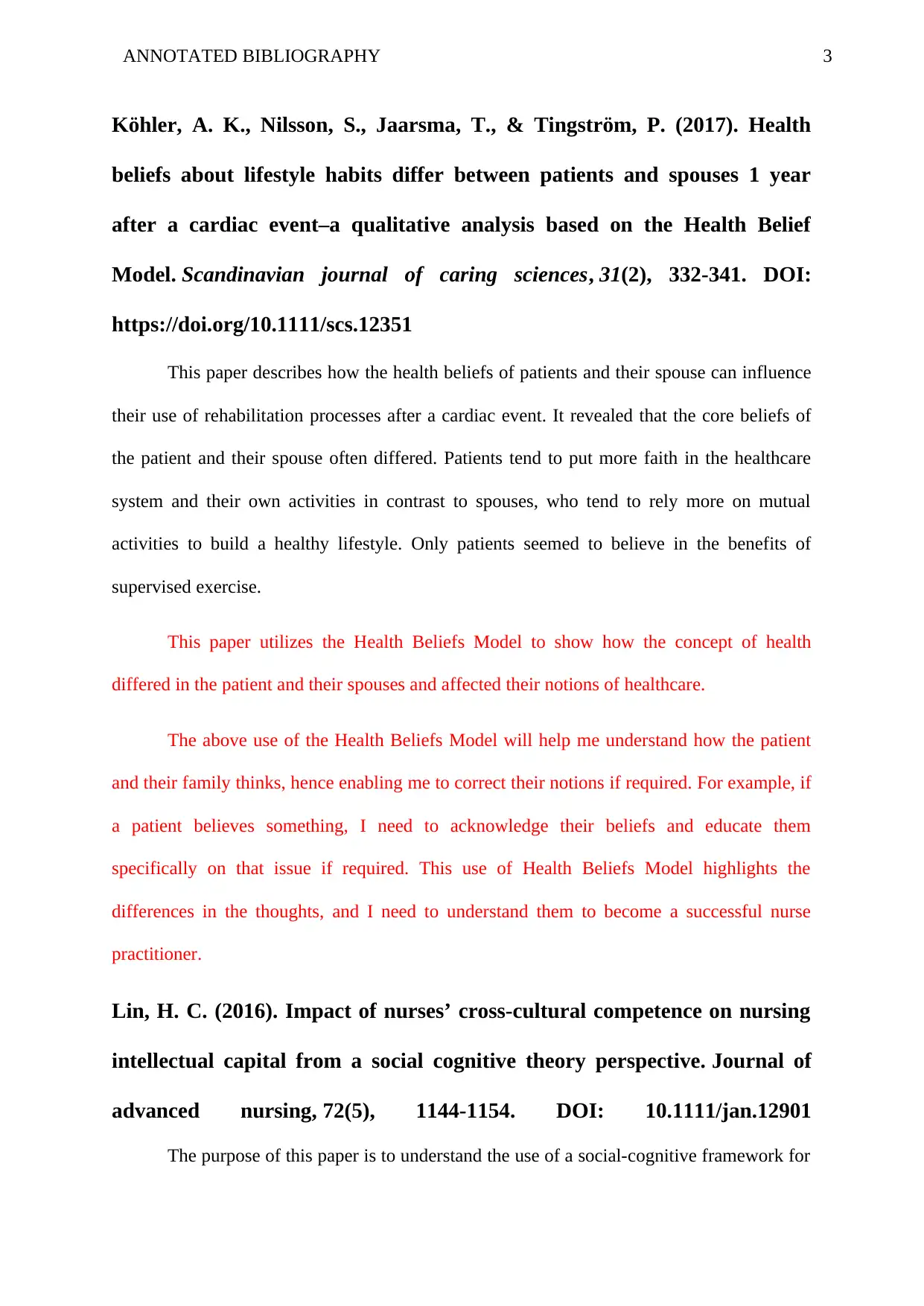
3ANNOTATED BIBLIOGRAPHY
Köhler, A. K., Nilsson, S., Jaarsma, T., & Tingström, P. (2017). Health
beliefs about lifestyle habits differ between patients and spouses 1 year
after a cardiac event–a qualitative analysis based on the Health Belief
Model. Scandinavian journal of caring sciences, 31(2), 332-341. DOI:
https://doi.org/10.1111/scs.12351
This paper describes how the health beliefs of patients and their spouse can influence
their use of rehabilitation processes after a cardiac event. It revealed that the core beliefs of
the patient and their spouse often differed. Patients tend to put more faith in the healthcare
system and their own activities in contrast to spouses, who tend to rely more on mutual
activities to build a healthy lifestyle. Only patients seemed to believe in the benefits of
supervised exercise.
This paper utilizes the Health Beliefs Model to show how the concept of health
differed in the patient and their spouses and affected their notions of healthcare.
The above use of the Health Beliefs Model will help me understand how the patient
and their family thinks, hence enabling me to correct their notions if required. For example, if
a patient believes something, I need to acknowledge their beliefs and educate them
specifically on that issue if required. This use of Health Beliefs Model highlights the
differences in the thoughts, and I need to understand them to become a successful nurse
practitioner.
Lin, H. C. (2016). Impact of nurses’ cross‐cultural competence on nursing
intellectual capital from a social cognitive theory perspective. Journal of
advanced nursing, 72(5), 1144-1154. DOI: 10.1111/jan.12901
The purpose of this paper is to understand the use of a social-cognitive framework for
Köhler, A. K., Nilsson, S., Jaarsma, T., & Tingström, P. (2017). Health
beliefs about lifestyle habits differ between patients and spouses 1 year
after a cardiac event–a qualitative analysis based on the Health Belief
Model. Scandinavian journal of caring sciences, 31(2), 332-341. DOI:
https://doi.org/10.1111/scs.12351
This paper describes how the health beliefs of patients and their spouse can influence
their use of rehabilitation processes after a cardiac event. It revealed that the core beliefs of
the patient and their spouse often differed. Patients tend to put more faith in the healthcare
system and their own activities in contrast to spouses, who tend to rely more on mutual
activities to build a healthy lifestyle. Only patients seemed to believe in the benefits of
supervised exercise.
This paper utilizes the Health Beliefs Model to show how the concept of health
differed in the patient and their spouses and affected their notions of healthcare.
The above use of the Health Beliefs Model will help me understand how the patient
and their family thinks, hence enabling me to correct their notions if required. For example, if
a patient believes something, I need to acknowledge their beliefs and educate them
specifically on that issue if required. This use of Health Beliefs Model highlights the
differences in the thoughts, and I need to understand them to become a successful nurse
practitioner.
Lin, H. C. (2016). Impact of nurses’ cross‐cultural competence on nursing
intellectual capital from a social cognitive theory perspective. Journal of
advanced nursing, 72(5), 1144-1154. DOI: 10.1111/jan.12901
The purpose of this paper is to understand the use of a social-cognitive framework for
⊘ This is a preview!⊘
Do you want full access?
Subscribe today to unlock all pages.

Trusted by 1+ million students worldwide
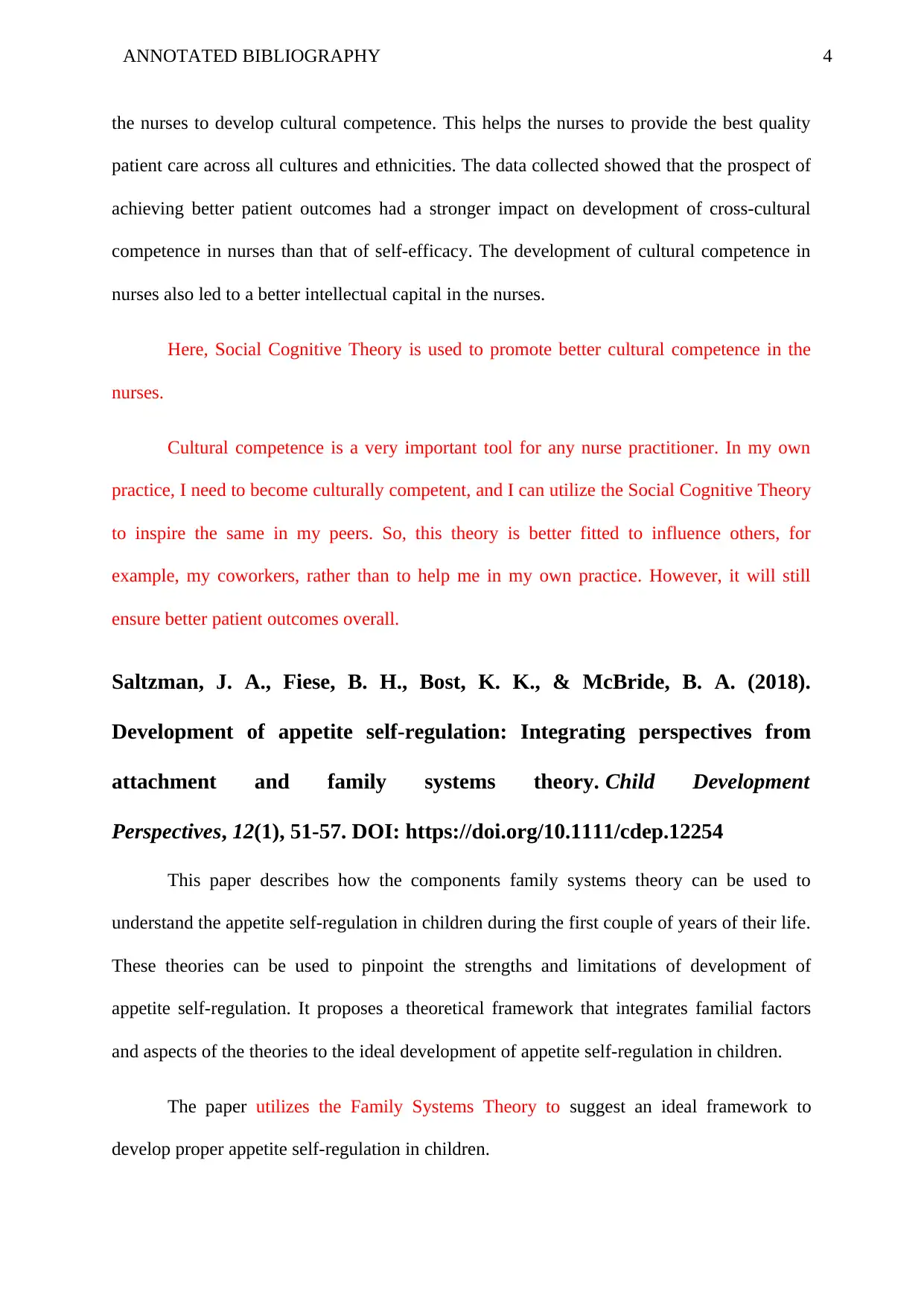
4ANNOTATED BIBLIOGRAPHY
the nurses to develop cultural competence. This helps the nurses to provide the best quality
patient care across all cultures and ethnicities. The data collected showed that the prospect of
achieving better patient outcomes had a stronger impact on development of cross-cultural
competence in nurses than that of self-efficacy. The development of cultural competence in
nurses also led to a better intellectual capital in the nurses.
Here, Social Cognitive Theory is used to promote better cultural competence in the
nurses.
Cultural competence is a very important tool for any nurse practitioner. In my own
practice, I need to become culturally competent, and I can utilize the Social Cognitive Theory
to inspire the same in my peers. So, this theory is better fitted to influence others, for
example, my coworkers, rather than to help me in my own practice. However, it will still
ensure better patient outcomes overall.
Saltzman, J. A., Fiese, B. H., Bost, K. K., & McBride, B. A. (2018).
Development of appetite self‐regulation: Integrating perspectives from
attachment and family systems theory. Child Development
Perspectives, 12(1), 51-57. DOI: https://doi.org/10.1111/cdep.12254
This paper describes how the components family systems theory can be used to
understand the appetite self-regulation in children during the first couple of years of their life.
These theories can be used to pinpoint the strengths and limitations of development of
appetite self-regulation. It proposes a theoretical framework that integrates familial factors
and aspects of the theories to the ideal development of appetite self-regulation in children.
The paper utilizes the Family Systems Theory to suggest an ideal framework to
develop proper appetite self-regulation in children.
the nurses to develop cultural competence. This helps the nurses to provide the best quality
patient care across all cultures and ethnicities. The data collected showed that the prospect of
achieving better patient outcomes had a stronger impact on development of cross-cultural
competence in nurses than that of self-efficacy. The development of cultural competence in
nurses also led to a better intellectual capital in the nurses.
Here, Social Cognitive Theory is used to promote better cultural competence in the
nurses.
Cultural competence is a very important tool for any nurse practitioner. In my own
practice, I need to become culturally competent, and I can utilize the Social Cognitive Theory
to inspire the same in my peers. So, this theory is better fitted to influence others, for
example, my coworkers, rather than to help me in my own practice. However, it will still
ensure better patient outcomes overall.
Saltzman, J. A., Fiese, B. H., Bost, K. K., & McBride, B. A. (2018).
Development of appetite self‐regulation: Integrating perspectives from
attachment and family systems theory. Child Development
Perspectives, 12(1), 51-57. DOI: https://doi.org/10.1111/cdep.12254
This paper describes how the components family systems theory can be used to
understand the appetite self-regulation in children during the first couple of years of their life.
These theories can be used to pinpoint the strengths and limitations of development of
appetite self-regulation. It proposes a theoretical framework that integrates familial factors
and aspects of the theories to the ideal development of appetite self-regulation in children.
The paper utilizes the Family Systems Theory to suggest an ideal framework to
develop proper appetite self-regulation in children.
Paraphrase This Document
Need a fresh take? Get an instant paraphrase of this document with our AI Paraphraser
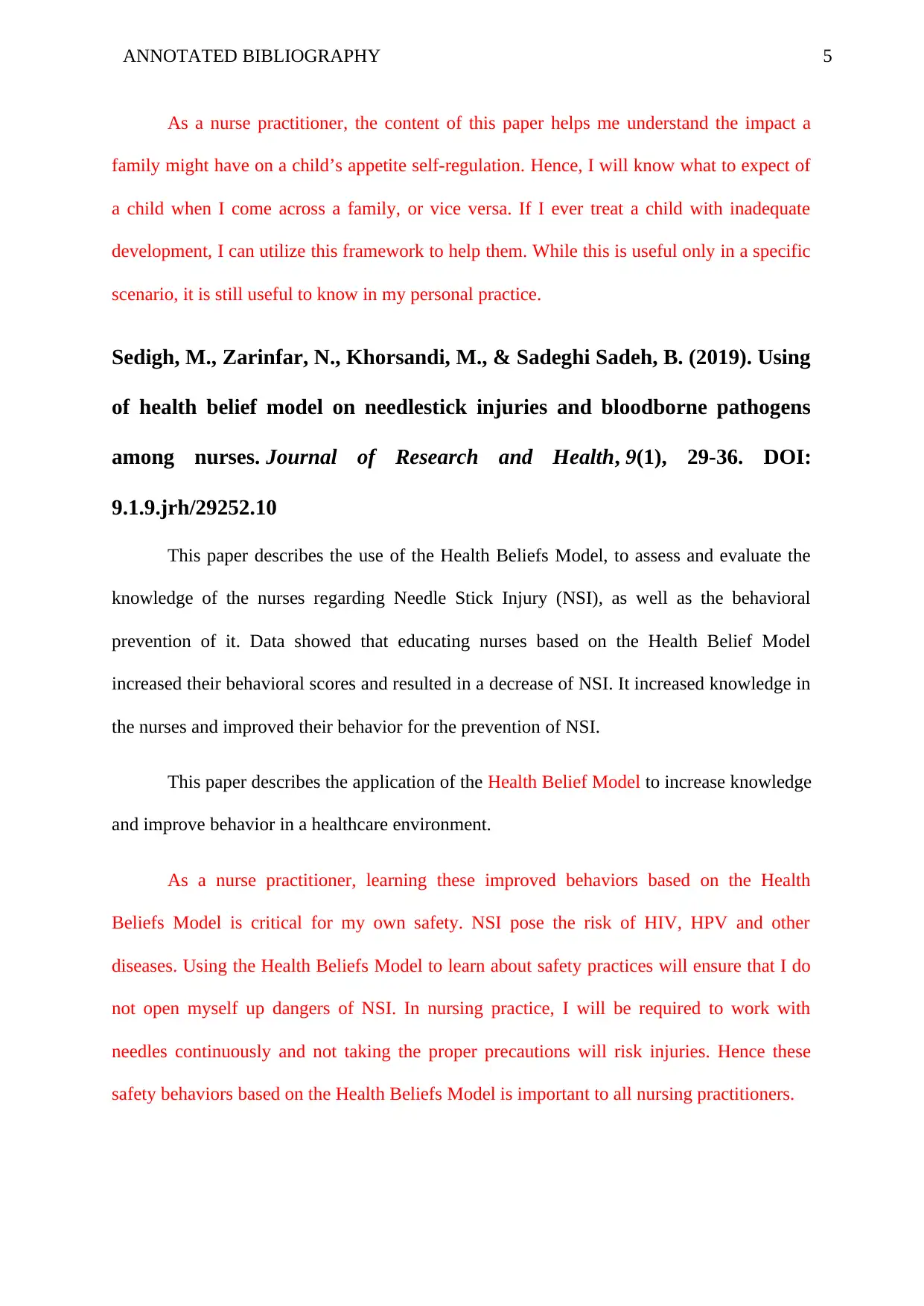
5ANNOTATED BIBLIOGRAPHY
As a nurse practitioner, the content of this paper helps me understand the impact a
family might have on a child’s appetite self-regulation. Hence, I will know what to expect of
a child when I come across a family, or vice versa. If I ever treat a child with inadequate
development, I can utilize this framework to help them. While this is useful only in a specific
scenario, it is still useful to know in my personal practice.
Sedigh, M., Zarinfar, N., Khorsandi, M., & Sadeghi Sadeh, B. (2019). Using
of health belief model on needlestick injuries and bloodborne pathogens
among nurses. Journal of Research and Health, 9(1), 29-36. DOI:
9.1.9.jrh/29252.10
This paper describes the use of the Health Beliefs Model, to assess and evaluate the
knowledge of the nurses regarding Needle Stick Injury (NSI), as well as the behavioral
prevention of it. Data showed that educating nurses based on the Health Belief Model
increased their behavioral scores and resulted in a decrease of NSI. It increased knowledge in
the nurses and improved their behavior for the prevention of NSI.
This paper describes the application of the Health Belief Model to increase knowledge
and improve behavior in a healthcare environment.
As a nurse practitioner, learning these improved behaviors based on the Health
Beliefs Model is critical for my own safety. NSI pose the risk of HIV, HPV and other
diseases. Using the Health Beliefs Model to learn about safety practices will ensure that I do
not open myself up dangers of NSI. In nursing practice, I will be required to work with
needles continuously and not taking the proper precautions will risk injuries. Hence these
safety behaviors based on the Health Beliefs Model is important to all nursing practitioners.
As a nurse practitioner, the content of this paper helps me understand the impact a
family might have on a child’s appetite self-regulation. Hence, I will know what to expect of
a child when I come across a family, or vice versa. If I ever treat a child with inadequate
development, I can utilize this framework to help them. While this is useful only in a specific
scenario, it is still useful to know in my personal practice.
Sedigh, M., Zarinfar, N., Khorsandi, M., & Sadeghi Sadeh, B. (2019). Using
of health belief model on needlestick injuries and bloodborne pathogens
among nurses. Journal of Research and Health, 9(1), 29-36. DOI:
9.1.9.jrh/29252.10
This paper describes the use of the Health Beliefs Model, to assess and evaluate the
knowledge of the nurses regarding Needle Stick Injury (NSI), as well as the behavioral
prevention of it. Data showed that educating nurses based on the Health Belief Model
increased their behavioral scores and resulted in a decrease of NSI. It increased knowledge in
the nurses and improved their behavior for the prevention of NSI.
This paper describes the application of the Health Belief Model to increase knowledge
and improve behavior in a healthcare environment.
As a nurse practitioner, learning these improved behaviors based on the Health
Beliefs Model is critical for my own safety. NSI pose the risk of HIV, HPV and other
diseases. Using the Health Beliefs Model to learn about safety practices will ensure that I do
not open myself up dangers of NSI. In nursing practice, I will be required to work with
needles continuously and not taking the proper precautions will risk injuries. Hence these
safety behaviors based on the Health Beliefs Model is important to all nursing practitioners.

6ANNOTATED BIBLIOGRAPHY
⊘ This is a preview!⊘
Do you want full access?
Subscribe today to unlock all pages.

Trusted by 1+ million students worldwide
1 out of 6
Related Documents
Your All-in-One AI-Powered Toolkit for Academic Success.
+13062052269
info@desklib.com
Available 24*7 on WhatsApp / Email
![[object Object]](/_next/static/media/star-bottom.7253800d.svg)
Unlock your academic potential
Copyright © 2020–2026 A2Z Services. All Rights Reserved. Developed and managed by ZUCOL.





